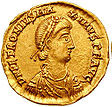 Henry Ford puts his first “quadricycle” through a test run on June 4, 1896. Ford would go on to transform transportation by applying the principles of the assembly line to automobile production, which would transform American life … and the world.
Henry Ford puts his first “quadricycle” through a test run on June 4, 1896. Ford would go on to transform transportation by applying the principles of the assembly line to automobile production, which would transform American life … and the world.
Category: Today
 Born on this date in 1821, Edward Livingston Youmans, American science writer and editor. In 1871 he started publication of the International Scientific Series of then-modern classics of scientific literature (published simultaneously first in New York, London, Paris, and Leipzig, later also in St. Petersburg and Milan), and the next year started the magazine Popular Science Monthly. In these and other venues he promoted the work of British philosopher Herbert Spencer, instigating Spencer to write the popular “The Study of Sociology,” and arranging publication of all of Spencer’s books with D. Appleton & Co., as well as many other international authors — with royalties on the sales (which in Spencer’s case reached 132,000 copies by 1890) going to the authors, despite the lack of an international copyright.
Born on this date in 1821, Edward Livingston Youmans, American science writer and editor. In 1871 he started publication of the International Scientific Series of then-modern classics of scientific literature (published simultaneously first in New York, London, Paris, and Leipzig, later also in St. Petersburg and Milan), and the next year started the magazine Popular Science Monthly. In these and other venues he promoted the work of British philosopher Herbert Spencer, instigating Spencer to write the popular “The Study of Sociology,” and arranging publication of all of Spencer’s books with D. Appleton & Co., as well as many other international authors — with royalties on the sales (which in Spencer’s case reached 132,000 copies by 1890) going to the authors, despite the lack of an international copyright.
June 2, Intolerable Acts
 On June 2, 1774, the Quartering Acts were passed by British Parliament, part of a package of punitive acts devised as a response to colonial unrest. The acts did not have the desired effect; they did not quell resistence. Instead, they became known as the “Intolerable Acts,” and helped fuel the fires of secession, leading to the American Revolution.
On June 2, 1774, the Quartering Acts were passed by British Parliament, part of a package of punitive acts devised as a response to colonial unrest. The acts did not have the desired effect; they did not quell resistence. Instead, they became known as the “Intolerable Acts,” and helped fuel the fires of secession, leading to the American Revolution.
Also on June 2: The Sack of Rome begins, and the Vandals bequeath their name to hooligans of the future (455 AD); President Grover Cleveland marries his ward, Frances Folsom, while in office (1886); the Bhutan Broadcasting Service brings TV to the Himalayan kingdom (1999).
June 1, General Motors files for bankruptcy
 On June 1, 2009, General Motors files for bankruptcy. The natural course of this fourth largest official business failure was forestalled by the auto maker bailout, which progressives would later ballyhoo as a complete success in that investors and businesses would jump on the rescued company — which is what would have happened in an unbailed-out bankruptcy, anyway.
On June 1, 2009, General Motors files for bankruptcy. The natural course of this fourth largest official business failure was forestalled by the auto maker bailout, which progressives would later ballyhoo as a complete success in that investors and businesses would jump on the rescued company — which is what would have happened in an unbailed-out bankruptcy, anyway.
June 1 births include musical geniuses Mikhail Glinka (1804) and Alanis Morissette (1974).
May 31, Emperor Petronius Maximus
 On May 31, 455, the Roman Emperor Flavius Petronius Maximus dies, soon followed by the Vandal sack of Rome. In a system without terms or term limits for rulers, his 78 days at the top of the Western Roman Empire ended as so many did, in violence — in this case by being stoned by an angry mob while fleeing the capital. His body was flung into the Tiber.
On May 31, 455, the Roman Emperor Flavius Petronius Maximus dies, soon followed by the Vandal sack of Rome. In a system without terms or term limits for rulers, his 78 days at the top of the Western Roman Empire ended as so many did, in violence — in this case by being stoned by an angry mob while fleeing the capital. His body was flung into the Tiber.
Also on this day, Genghis Khan was born in 1162 AD. On a more positive note, other May 31 births include less violent folks such as composer Marin Marais (1656), poet Walt Whitman (1814), philosopher and economist Henry Sidgwick (1838), clergyman Norman Vincent Peale, and actors Don Ameche (1908), Alida Valli (1921), Denholm Elliott (1922), Clint Eastwood (1930), and Brooke Shields (1965).
On May 21, 1979, the White Night riots erupted in San Francisco following the manslaughter conviction of Dan White for the assassinations of George Moscone and Harvey Milk.
On May 21, 1981, Irish Republican hunger strikers Raymond McCreesh and Patsy O’Hara die on hunger strike in Maze prison.